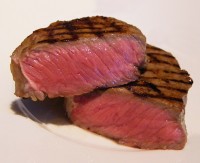Steak: is medium-rare truly superior to well done?
 Depending on when you went through your childhood and teenage years, you may have been taught to cook your meat until it’s properly done. In other words, there would be no tinge of red when you’d cut into your favourite steak.
Depending on when you went through your childhood and teenage years, you may have been taught to cook your meat until it’s properly done. In other words, there would be no tinge of red when you’d cut into your favourite steak.
Over the past couple of decades, this attitude has seemingly changed. When you watch shows such as Masterchef or My Kitchen Rules, the judges and fellow contestants tend to salivate over a medium-rare slice of meat while condemning any cut that happens to be “well done”.
Part of the reason we see more steak being cooked at variations other than well done is because we now know that whether or not a piece of steak is safe to eat is related to the temperature it reaches, rather than cooking it until the blood-like redness is gone. But while that means we have plenty of options for enjoying our steak, is one really better than the other?
Medium-rare vs well done
Here’s the simple truth – there is no “superior” style of cooked meat. Whether you have your steak medium-rare or well done (or any of the variation in between, as well as extra rare and rare) is simply personal preference. Yes, medium-rare steak will usually be more tender and juicy, but well done steak can also be tender and juicy – it’s all about how you cook it.
One of the key concerns with well done meat is something called heterocyclic amines (HCAs). These HCAs form when the amino acids and creatine in meat react at high temperatures. Naturally, when cooking a well done steak, higher temperatures will be reached and the likelihood of HCAs forming increase.
In humans, these HCAs can attribute to an increased likelihood of suffering from colon polyps or certain cancers. Of course, people who eat large amounts of red meat (regardless of cooking style) also increase their risk of colorectal cancer, Type 2 diabetes, and coronary heart disease. Cancer experts suggest eating no more than around 510 grams of red meat per week, regardless of how you cook it.
Returning to those who prefer their meat well done, there are several steps you can take to reduce the formation of HCAs. These steps include:
- When cooking your meat, cut them into smaller portions as opposed to full cuts. When the portions are smaller, they take less time to be cooked well done. The less time spent cooking the meat, the less time HCAs have to form.
- If you do have meat that is going to require a longer cooking time, pre-cooking it in the microwave actually helps significantly reduce the formation of HCAs. Pop it in the microwave for about two minutes, drain any juices that have come out, then finish the cooking on your stove or barbecue.
- If you marinate your meat with a marinade containing ingredients such as vinegar, citrus juice, vegetable oil and/or spices, this can help prevent the formation of HCAs. Make sure to marinate your meat for at least 10 minutes before cooking.
- Cook at lower temperatures. You can still achieve a well done steak at lower temperatures, it will just take longer. These lower temperatures will help ensure that the steak’s amino acids and creatine cannot react to one another.
- If you’re creating beef patties for burgers, including garlic and fresh chopped rosemary in the mixture will block the formation of HCAs when cooked. Patties need to reach an internal temperature of 71° C, so cooking them at a lower temperature isn’t an option in this case. Beef patties must be cooked well done, regardless of your personal preference.
With medium-rare steaks, you should always aim for a temperature between 55 to 60° C. This will kill harmful bacteria, and the formation of HCAs will be unlikely.
Regardless of whether you love your steak medium-rare, well done, or in any other style, there is no “superior” option. If you’re a lover of a well done steak, just make sure to observe the above tips to ensure you’re cooking your meat without it forming HCAs.
How do you like your steak? Be sure to share with us in the comments below.